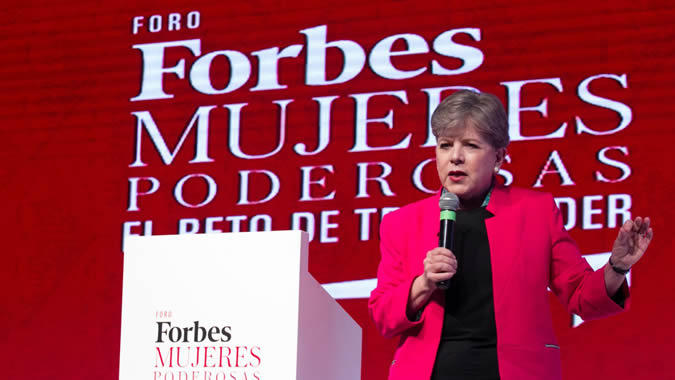Press Release
Women must break the glass ceiling through emancipation and political, physical and economic autonomy, Alicia Bárcena, Executive Secretary of the Economic Commission for Latin America and the Caribbean (ECLAC), sustained today during a presentation at the Forbes Powerful Women Forum 2017, held in Mexico City.
The most senior representative of the United Nations regional body indicated that women in the region must achieve equality but with entitlement to rights, “not to have more or less money, not to have more or fewer means, not just for our own individual will.”
She said that women’s economic autonomy is fundamental because it represents true emancipation. However, she warned that poverty wears a woman’s face in the region.
In Latin America and the Caribbean, 75 million people suffer extreme poverty, while 185 million live in situations of poverty, Bárcena said.
This is compounded by the wide wage gap between men and women, which still stands at 18% in the region. “This is not fair. We have to fight so that women with similar jobs receive the same pay as men,” ECLAC’s top representative stated.
In terms of physical autonomy, Alicia Bárcena emphasized that sexual and reproductive rights are essential: “It’s about deciding about ourselves; our body, our territory.”
She added that officials must effectively address teenage pregnancy, which is one of the deepest expressions of inequality and mainly affects the poorest populations in Latin American and Caribbean societies. She also urged for eliminating maternal mortality and raising the visibility of its indicators.
The senior United Nations official warned that “the great scourge that still persists in our region is violence against women,” adding that, despite multiple initiatives, it continues to be a grave problem, not only in poor households but also in high-income ones.
With regard to decision-making, women need more participation in hierarchical positions and greater access to ownership of financial assets and property, she affirmed. Bárcena noted that the presence of women in spheres of power does not surpass 30%.
ECLAC’s Executive Secretary recalled that gender equality is an axis of the 2030 Agenda for Sustainable Development, a roadmap that puts equality at the center, especially gender equality.
She specified that there are three indispensable policy objectives that must be applied in order to achieve equality for women: redistributing income and time, which takes the care economy into account; breaking the statistical silence to raise visibility of women’s situations; and, finally, pushing for deliberate public policies aimed at resolving sex-based inequality gaps.
“I think we must bet on a new development pattern, a political task. We must find a clear direction and change the conversation. Equality is the goal on the horizon and we must move from a culture of privilege to a culture of equality,” she concluded.



